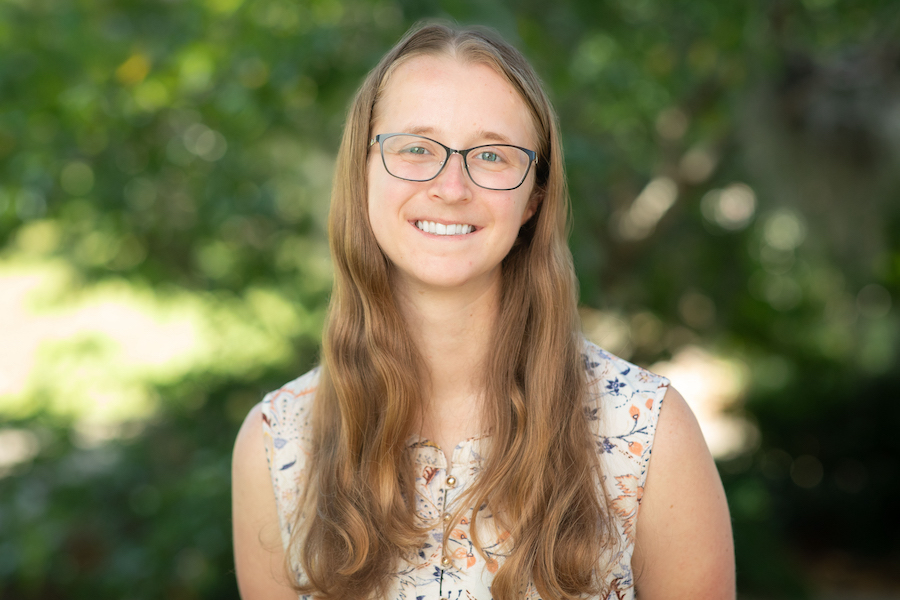Student Spotlight: Grace Hickey

Grace Hickey is a Florida State University senior pursuing dual bachelor’s degrees in computational science, through the Department of Scientific Computing, and cell and molecular neuroscience through the Program in Neuroscience, an interdisciplinary program with participation from the Department of Biological Science and Department of Psychology, both part of the College of Arts and Sciences, and FSU’s College of Medicine. Hickey is part of the Presidential Scholars Program, the premier merit scholarship providing four years of support for undergraduates, and is set to graduate in Spring 2026. She was awarded the national 2025 Barry Goldwater Scholarship for her research and academic excellence, and she recently conducted research with the Air Force Research Laboratory among other projects.
Tell us about your background, where you’re from, and what brought you to FSU.
I grew up in the Florida Panhandle. My mom is a chemist, and her work inspired my own research interests. FSU offered the best opportunities for undergraduate research. When I toured campus, I could tell the environment was extremely welcoming to undergraduates, which was a huge factor in my decision.
What inspired you to pursue dual degrees in cell and molecular neuroscience and computational science?
I planned to major in neuroscience for a few years before starting college. I added computational science as a major during my sophomore year after learning about computational neuroscience and modeling because I enjoy coding. While I don’t plan to become a computational neuroscientist, the computational skills I’ve gained are useful for many non-modeling applications in my work.
Tell us about earning the 2025 Barry Goldwater Scholarship, which recognizes outstanding undergraduates pursuing research careers in natural sciences, mathematics and engineering, and what this means to you.
It’s been an amazing opportunity. I spent a lot of time working on my application with FSU’s Office of National Fellowships and associate professor of psychology Elizabeth Hammock. The application process allows you to verbalize what you’re passionate about, which was a great way to think deeply about my goals. Earning the award was incredible assurance that I’m on the right track to pursue a research career and speaks to how wonderful FSU’s environment for undergraduate research is; I believe the opportunities available at FSU directly led to me receiving this scholarship.
What are some current goals or projects that you’re working toward?
My two big projects right now are my honors thesis and graduate school applications. My honors thesis focuses on how peripheral oxytocin receptors outside the brain, which help regulate social and stress-related processes in the body, influence behavior during isolation. A goal of mine is to implement neural network-based pose estimation, an artificial intelligence tool that uses computer vision to record the arrangement of key body parts, in order to track positions of the study subjects on video and analyze their behavior. One of my favorite parts of this project has been using both experimental and computational tools to answer my research questions.
What’s something people don’t know about studying neuroscience and computational science?
There’s a lot of interplay between scientific computing and neuroscience. While I’m most interested in neuroscience-centered research questions, studying computational science has given me additional quantitative tools. I’m able to take data from the lab and apply additional analysis methods, like the pose estimation tools I’m using for my honors thesis, to analyze more data in more efficient ways. It’s also provided me with a better understanding of computational neuroscience research, which is heavily focused on mathematical modeling.
What aspects of your areas of study do you find most rewarding?
I love neuroscience because of the questions I get to answer; there’s a lot we don’t know about the brain, and I find it exciting that I can help answer those questions. I also enjoy the problem-solving aspects of research, both in the lab and regarding computational problems.
Tell us about your recent internship with the Air Force Research Laboratory.
My work with the Air Force Research Laboratory in Summer 2025 was a fun way for me to get out of my comfort zone by introducing me to an entirely new field. The previous summer, I researched electrophysiology of insect eyes by recording electrical signals in their eyes to analyze how they respond to light. This summer, I researched structural differences in the visual processing parts of insect brains across different species. I enjoyed working with scientists from different fields and learning about new topics, as it broadened my idea of what neuroscience research looks like and what fields I could be interested in. Plus, I can now confidently say I’m a bug lover.
What on-campus resources have helped you achieve success?
I can’t praise the Office of National Fellowships enough. They’ve helped me with every scholarship and summer research program application; they know how to help you put your best foot forward. The Undergraduate Research Opportunity Program was also a great resource as a freshman. It provided a structured environment to learn about research and scientific communication while also giving me the chance to start working in a research lab.
Are there any faculty or staff who helped or inspired you?
I wouldn’t be in the same place without Dr. Hammock. She’s been my primary research mentor since freshman year and has been incredibly supportive and engaging. She’s helped me strengthen my lab-specific and research-related skills. I’m prepared to start graduate school next year and pursue more independent research because of her. I’ll miss her and the Hammock Lab of Social Neuroscience a lot after I graduate!
Following your graduation, what are your plans? Even though you might miss FSU, what are you looking forward to once you graduate?
I’m hoping to enter a doctoral program in neuroscience next fall. I’ll miss FSU, but I can’t wait to take everything FSU has taught me and apply it to my graduate studies. I’ve learned so much that I’ll carry with me for a long time, both academically and personally.
